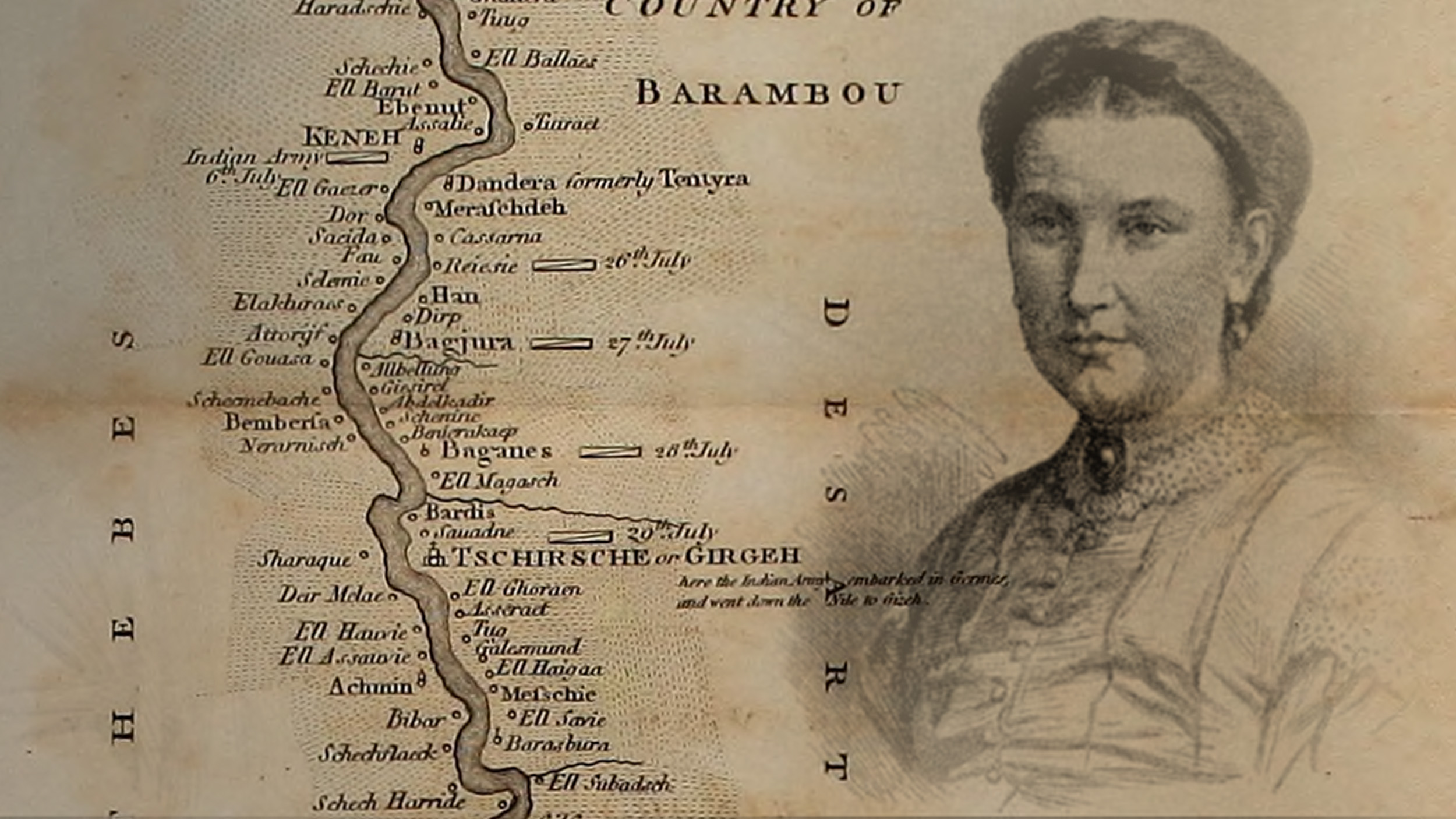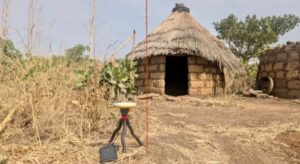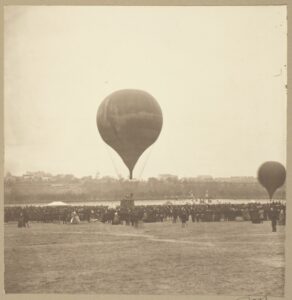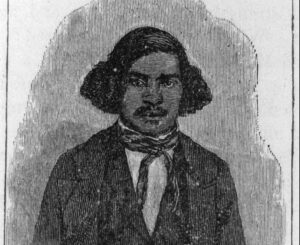In 1861, in present-day South Sudan, Victorian explorer and naturalist Samuel Baker found himself in a bit of a pickle. He was in the middle of an expedition up the Nile and deep in dispute with his porters. Baker was a bristly bearded big game hunter somewhat known for his inflexibility, and his porters were exhausted and frustrated.
For any other explorer of the age, it might have meant the end of the journey. But into the breach stepped a 20-year-old woman — Baker’s camel-riding, pistol-packing, multilingual wife, Florence.
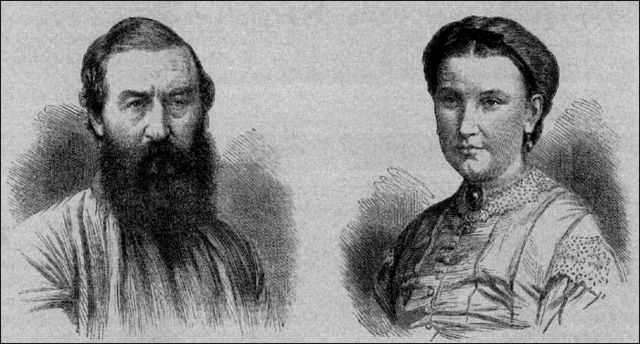
Samuel Baker and Florence Baker were a Victorian-era exploration power couple. Photo: Wikimedia Commons
Even at that tender age, Florence’s life was already packed with adventure and loss. She was no stranger to hardship and compromise. She deftly negotiated an agreement between Baker and his men, and the expedition ultimately concluded successfully with the European discovery of Lake Albert (Lake Mwitanzige).
Many of the Victorian adventurers discussed in the Great Explorers column came from relatively privileged backgrounds and only faced their true tests when they arrived at the far-flung locations they meant to explore. Not so with Florence Baker, also known variously as Florence Barbara Marie Finnian, Florica Maria Sas, Maria Freiin von Sas, or Barbara Maria Szász.
A person doesn’t get that many names sitting in a London parlor.
Orphaned and enslaved
Much of Florence Baker’s early life is shrouded by incomplete records and conflicting accounts. But the broad strokes of the story — passed down through her family line and mostly corroborated by contemporary sources — are as follows.
Florence Baker was born in the Kingdom of Hungary, in modern-day Romania. She was orphaned in 1848 when marauders associated with the revolutionary Ioan Axente Sever murdered her parents and brother. Here, the seven-year-old girl passes from the historical record and re-emerges as an 18-year-old for sale in the slave market of Vidin, a fortified town on the River Danube.
Meanwhile, 38-year-old Samuel Baker and his friend Maharaja Duleep Singh were looking for a bit of entertainment in the middle of a year-long hunting trip across Central Europe. The two ended up in the Vindin slave market, where Baker promptly entered a bidding war for Florence with the Pasha of Vidin. The Pasha won the auction, but Baker bribed the market guards and promptly escaped with Florence in tow.
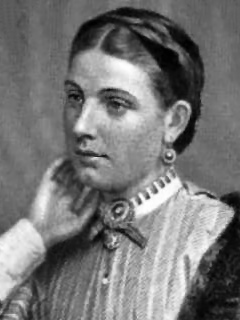
Photo: Wikimedia Commons
It’s unclear at what point in the years that followed the two became romantically entangled. It likely didn’t take long, just one of many details of Florence’s early life that are problematic to modern readers. Indeed, the whole story later struck a luminary of Victorian society as distasteful, leading to problems for the pair further down the road.
By all accounts, the relationship (and later marriage) was consensual, even passionate by Victorian standards. Florence went on to accompany Baker on his travels as his career transitioned from military man, engineer, and hunter to explorer and author.
Africa and the Nile
In 1861, Samuel and Florence began an expedition up the White Nile to discover its source — long a Holy Grail of Victorian exploration. The gifted Florence already spoke Hungarian, German, Romanian, and Turkish when the pair met and picked up Arabic en route to Africa. Somewhere along the way, she learned to shoot (probably from Samuel), was a skilled camel rider, and boasted a forceful personality in a male-driven society.
It was in the early days of this journey that Florence neutralized Samuel’s porter problem. If anyone in the group harbored doubts about her value on the expedition after that, those doubts were assuaged when Florence proved herself a capable medic in the face of Africa’s many diseases.
Unfortunately for Samuel, another pair of explorers with a head start had already made the sought-after discovery.
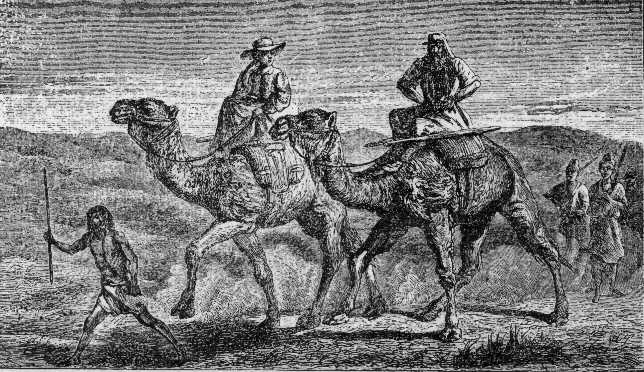
The Bakers adventuring in Africa, from a book published in 1890. Photo: Wikimedia Commons
Too late for the Nile
Samuel and Florence encountered John Speke and James Grant as the latter pair traveled downstream to Egypt. Speke and Grant had just confirmed Lake Victoria (Ukerewe) as the source of the White Nile. It must have been a bitter disappointment to Samuel.
But based on information given to them by Speke and Grant, Florence and Samuel continued upstream and were the first Europeans to lay eyes on Lake Albert, in 1864. The lovers were also the first Europeans to see Murchison Falls (Kabalega Falls) — a 7m wide, 43m tall gorge at the inlet of Lake Albert.

Murchison Falls at the inlet of Lake Albert.
Florence and Samuel had married at some point in the preceding years but had a proper British ceremony when they returned to Samuel’s homeland in 1865. Samuel was feted as a hero: given awards by the Royal Geographical Society and Paris Geographical Society and knighted in 1866.
But there’s a reason Sir Samuel Baker doesn’t enjoy the lasting fame of Burton, Speke, Livingston, and other African explorers. That reason is Florence, Lady Baker — or to be more specific, the singular nature of the pair’s early years together.
Queen Victoria was apparently scandalized by the story, particularly the (almost certainly correct) assumption that Florence and Samuel had enjoyed physical relations before being properly married. She refused to have the pair in court. And despite being a charming and adventurous couple popular with the rest of Victorian society, the royal snubbing crippled any further exploration goals the pair entertained.
To Africa and back (again)
In 1869, Sir Samuel was tapped by the ruler of Sudan to suppress and eradicate slave trading along the equatorial Nile. It’s a bit of dramatic irony for a man who once visited a slave market as an entertaining diversion from a hunting trip. But perhaps his wife’s early life — and the stories she no doubt shared with him — led to a bit of enlightenment.
In any case, Lady Florence once again accompanied her husband to Africa. It was a major military campaign, with Sir Samuel at the head of 1,700 Egyptian troops. The force saw heavy resistance from locals with a financial stake in the slave trade.
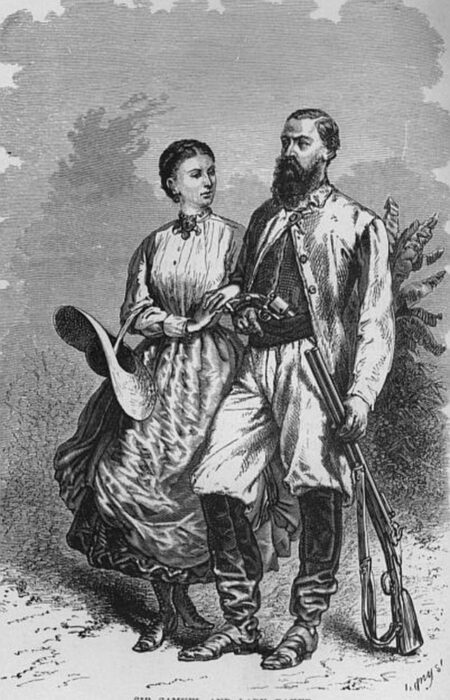
Photo: Wikimedia Commons
Florence spent the next four years crawling around battlefields as a medic, toting rifles, pistols, a flask of brandy, and two umbrellas (presumably to shade wounded soldiers from the harsh sun.)
History remembers Samuel’s efforts to suppress slavery along the Nile with mixed results. He didn’t make huge strides there, but the general assessment is that he laid the foundations upon which others later built.
Return to England
By the time the pair returned to England and settled in Devon in 1874, Sir Samuel was 53, and Lady Florence was 33. Samuel still traveled to hunt and published a handful of books about his earlier adventures. But for the most part, the couple’s roaming days were behind them. In fact, in 1883, a British general requested Samuel’s help in Egypt’s Mahdist War. But Lady Florence was reluctant to return to Africa, and Samuel refused to travel there without her.
Samuel Baker died in 1893 of a heart attack at the age of 72. Lady Florence lived another 33 years without him, primarily with her stepdaughter Ethel and eight servants. She must have made a wonderful dinner guest.
Lady Florence Baker died on March 11, 1916. In the coming days, the newspapers would be filled with horrific accounts of the Battle of Verdun. The death of Lady Florence, whose life seems ripped straight from the pages of a Victorian adventure novel, barely made the news.
